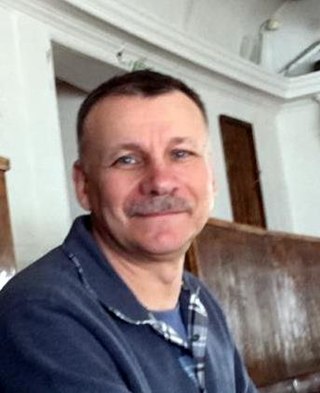Top Qs
Timeline
Chat
Perspective
Gennadiy Borisov
Amateur astronomer who discovered the first known interstellar comet From Wikipedia, the free encyclopedia
Remove ads
Gennadiy Vladimirovich Borisov (Russian: Генна́дий Влади́мирович Бори́сов; born in 1962 in Kramatorsk)[2] is a Crimean[4] telescope maker and amateur astronomer who discovered the first-known interstellar comet, 2I/Borisov, in 2019.
Remove ads
Work
Summarize
Perspective
Borisov works as an engineer at the Crimean Astronomical Station[Note 1] of the Sternberg Astronomical Institute of Moscow State University.[5][6] There, he maintains the telescopes, but does not make observations himself. He also works with Astronomicheskiy Nauchnyy Tsentr JSC, creating experimental telescopes in collaboration with Roscosmos.[7]
Borisov pursues astronomy in his spare time at his personal observatory MARGO located in Nauchnyi, in the southern part of the Crimean peninsula. Between 2013 and 2019, he discovered nine comets[8] and several near-Earth objects (NEOs) such as 2013 TV135.[5] These discoveries were made using telescopes he designed and built himself: GENON (2 comets), GENON Max (5 comets)[7][1] and the HGB-650 0.65 m telescope (2 comets, including 2I/Borisov). In 2014, Borisov received two Edgar Wilson Awards for his discoveries of C/2013 N4 and C/2013 V2.[9] Borisov also discovered the asteroid 2023 BU, another near-Earth object that passed within 4,000 km of the Earth in January 2023. He also observed cometary activity on NEO (523822) 2012 DG61, making it a Near-Earth Comet (NEC). The cometary activity was later independently discovered and confirmed by scientists of the Active Asteroids project.[10]
Remove ads
Discovery of 2I/Borisov
Summarize
Perspective
In early 2019, Borisov completed his new 0.65-meter telescope.[11][5] On August 30, 2019, he used this telescope to discover the first known interstellar comet, 2I/Borisov, which is only the second interstellar object to have been observed.[5][12]
Borisov described his discovery thus:[13]
I observed it on August 29, but it was August 30 GMT. I saw a moving object in the frame, it moved in a direction that was slightly different from that of main asteroids.[Note 2] I measured its coordinates and consulted the Minor Planet Center database. Turned out, it was a new object. Then I measured the near-Earth object rating,[Note 3] it is calculated from various parameters, and it turned out to be 100% – in other words, dangerous. In such cases I must immediately post the parameters to the world webpage for confirmation of dangerous asteroids.[Note 4] I posted it and wrote that the object was diffuse and that it was not an asteroid, but a comet.
The discovery of 2I/Borisov by Gennadiy Borisov has been compared to the discovery of Pluto by Clyde Tombaugh.[7] Tombaugh was also an amateur astronomer who was building his own telescopes, although he discovered Pluto using Lowell Observatory's astrograph.
Remove ads
Discovery of 2023 BU
On January 21, 2023, Borisov discovered the relatively small asteroid 2023 BU, only 5 days before it would pass an initially calculated 9,975 ± 27 km (6,198 ± 17 mi)[citation needed] from the centerpoint of Earth, closer than geostationary satellites but further than low Earth orbit satellites.
Views
Borisov thinks that soon amateur astronomers will no longer be able to discover new comets: "In 2016, only I discovered a comet. In 2013, there were seven of us. Every year there are less and less. There are more and more huge telescopes. Amateurs will soon have nothing left."[7]
See also
Notes
- Not to be confused with the Crimean Astrophysical Observatory, which is located right next to it.
- NEO Rating for calculating the probability that a new object is a near-Earth candidate.
- The NEO Confirmation Page for confirming near-Earth objects and potentially hazardous objects.
References
External links
Wikiwand - on
Seamless Wikipedia browsing. On steroids.
Remove ads


